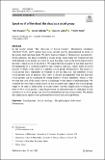Files in this item
Speak no ill of the dead : the dead as a social group
Item metadata
| dc.contributor.author | Kaspers, Tom | |
| dc.contributor.author | LiBrizzi, Jacob | |
| dc.contributor.author | Calosi, Duccio | |
| dc.contributor.author | Kobe, Yoichi | |
| dc.date.accessioned | 2022-05-09T13:30:20Z | |
| dc.date.available | 2022-05-09T13:30:20Z | |
| dc.date.issued | 2022-05-06 | |
| dc.identifier | 278930758 | |
| dc.identifier | a1de2e55-6851-44ba-9221-15715a1fff75 | |
| dc.identifier | 000791787700004 | |
| dc.identifier | 85129646381 | |
| dc.identifier.citation | Kaspers , T , LiBrizzi , J , Calosi , D & Kobe , Y 2022 , ' Speak no ill of the dead : the dead as a social group ' , Synthese , vol. 200 , 210 . https://doi.org/10.1007/s11229-022-03512-5 | en |
| dc.identifier.issn | 0039-7857 | |
| dc.identifier.uri | https://hdl.handle.net/10023/25321 | |
| dc.description.abstract | In her recent article “The Ontology of Social Groups”, Thomasson (Synthese 196:4829–4845, 2019) argues that social groups can be characterized in terms of the norms that surround them. We show that according to Thomasson’s normativity-based criterion, the dead constitute a social group, since there are widespread and well-defined social norms as to how to treat the dead, such as the norm expressed in the title (“Speak no ill of the dead”). We argue that the example of the dead must not be interpreted as a counterexample to this criterion, and that, rather, there are good reasons to think of the dead as a genuine social group. Furthermore, the dead as a social group exist, regardless of whether or not the dead (i.e. the members of this social group) exist as persons. This view is clearly incompatible with the idea that social groups can be explained by citing features of their members, which is why we take the case of the dead to pose a challenge for the thesis of individualism. We consider the ontological implications of this example and suggest that social groups ought to be seen as reifications of social norms. Another implication of taking the dead to be a social group is that the presence of external norms is sufficient for the existence of a social group, and therefore internal norms are not necessary. We defend this implication against some potential theoretical and moral problems. | |
| dc.format.extent | 17 | |
| dc.format.extent | 276196 | |
| dc.language.iso | eng | |
| dc.relation.ispartof | Synthese | en |
| dc.subject | Social groups | en |
| dc.subject | Social ontology | en |
| dc.subject | The philosophy of the dead | en |
| dc.subject | Normativity | en |
| dc.subject | B Philosophy (General) | en |
| dc.subject | T-DAS | en |
| dc.subject | NIS | en |
| dc.subject.lcc | B1 | en |
| dc.title | Speak no ill of the dead : the dead as a social group | en |
| dc.type | Journal article | en |
| dc.contributor.institution | University of St Andrews. University of St Andrews | en |
| dc.contributor.institution | University of St Andrews. Philosophy | en |
| dc.identifier.doi | https://doi.org/10.1007/s11229-022-03512-5 | |
| dc.description.status | Peer reviewed | en |
This item appears in the following Collection(s)
Items in the St Andrews Research Repository are protected by copyright, with all rights reserved, unless otherwise indicated.

